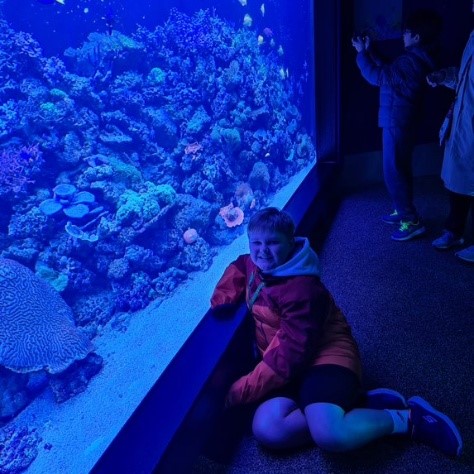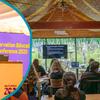As we prepare for the BIAZA World Autism Acceptance Campaign, Emma Whitbread, Community Engagement Officer at London Zoo, writes about accessibility and bringing new audiences to the Zoo...
Thanks to support of the National Lottery Heritage Fund (NLHF), who funded the renovation of our Snowdon Aviary into our new exhibit Monkey Valley, home to our troop of Colobus Monkeys. Part of the agreement with NLHF was that London Zoo would recruit a Community Engagement team to deliver a range of events and activities for underrepresented audiences, and thankfully I was one of the team members recruited back in the summer of 2018.
Having come into the zoo world from the voluntary sector, it is a very different place to work, but I absolutely love it. My favourite part of my role is that I can bring different audiences into the Zoo and work with them to make our Zoo as accessible as we can, considering we are nearly 200 years old this was quite the mammoth task.
Back in early 2019 we ran a co-creation project in partnership with Leonard Cheshire, a residential care charity. The attendees were young, neurodivergent people from Lambeth and Roots and Shoots college. The project was mutually beneficial as the young people gained an accreditation and attended workshops with our Creative and Marketing teams. The young people were given the opportunity to feedback to both teams about their needs and how the work the teams do could be more accessible for neurodivergent people. They also supported us in designing a trail for other neurodivergent people to navigate the zoo and the called it “The Roursome Animals in London (TRAIL)”. They were keen to ensure the TRAIL would be used by everyone but kept it simple and easy to use, including information on how busy or quiet different exhibits are.
Here are a few quotes from the Young People who attended the project:
- ‘I learned more about ZSL and understand a bit more about what they do’ – Greg, participant
- ‘I made a poster about the Zoo and presented it with confidence’ – participant
The next steps for me were to complete Access for All's Accessibility Awareness Train the Trainer Training this took place during the COVID lockdowns, so most sessions were delivered online. However, the final day we manged to get together and we learned the practicalities of delivering the training. Since then, I have delivered training to 140 visitor facing staff and volunteers, 85% of whom rated the training as good or excellent. The training aims to support staff and volunteers to feel more confident in communicating with people with additional needs or disabilities.

This video is one that I use in my training, it comes with a warning as it can be tough to watch but it demonstrates how overstimulation feels for a person with autism.
On the training we also learned that Visit England had created an Access Guide template which is to replace Accessibility Statements and means that people with disabilities will know where to look for specific information as the aim is for all organisations to start using the template. I will admit it not an easy task to set up the guide, but it is worth it.
You will find our guide on our, accessibility page along with the TRAIL, sensory and visual stories and our queue hopping Penguin Pass. We have a new accessibility video on the page too created with young people with disabilities from North West London.
With the support of all the teams across the Zoo we have been able to create a monthly Relaxed Tour. We started by running tours in the morning before we open and have since added Relaxed Lates over the summer months.
We run tours but they are very different to other tours, there is no script and although we plan the route in advance, we do keep the tour very informal. Sometimes we have children that are very speedy on the tours with other participants who may have limited mobility, so we have plenty of people to support which means we can break up into smaller groups if needs be. The most people we would book on to a tour would be 25 to ensure the tour does stay relaxed. Having said that we have rarely reached that number as on the day there is always some that cannot attend. We set the dates at various times throughout the months, some at weekends and school holidays for families but we also run some sessions during term time for Neurodivergent people not in education.
My top tips for running a relaxed session would be:
- Recruit staff or volunteers who would be happy to be involved in delivering the session or tour.
- Ensure that you have commitment from all the teams who would normally be busy preparing the zoo for the day ahead that they will keep noise to a minimum at least whilst the participants are passing by. This may include keeping radios turned down or wearing an earpiece, hand dryers and soundscapes are turned off. Also lighting needs to not be to bright. The most important factor of a relaxed session is to ensure that all participants feel welcome and safe.
- Check with all participants at the start of the tour if they have any access needs and what their tolerance is to sound – even though we ask this when we book people in, we always double check on the day. It also means if no one has an issue with sound that we can visit our noisier residents such as our macaws.
- Finally, be flexible and patient, what works on one session may not work on the next, so, continue to learn from the participants.

There is just one more tip to share with you and that is if you are not sure about anything, just ask the experts – neurodivergent people. Hearing from people with lived experience is the best way to learn and develop your offer.
A wise person once said it’s better to try to do something new and make mistakes (and learn from them) then to not try at all.
Please do share your experiences with us and do not hesitate to get in touch if you have any questions – [email protected]
All blogs reflect the views of their author and are not a reflection of BIAZA's positions.
Related Members
-
News
 Blog: Why Hosting a BIAZA Conference Matters 3rd March, 2026For this week's blog, Chris Eley (Hertfordshire Zoo) recounts the value of hosting a BIAZA event in 2025: In November 2025, we hosted the BIAZA…
Blog: Why Hosting a BIAZA Conference Matters 3rd March, 2026For this week's blog, Chris Eley (Hertfordshire Zoo) recounts the value of hosting a BIAZA event in 2025: In November 2025, we hosted the BIAZA… -
News
.png?w=100&h=100&zc=1&f=jpeg&hash=97e6d151315c515d23f80e6ee9d1d533) BIAZA Blog: How Accreditation is creating change at BIAZA 25th February, 2026After two years of BIAZA Accreditation, the team delivers a look ahead on the programme to support and boost world-class zoos…
BIAZA Blog: How Accreditation is creating change at BIAZA 25th February, 2026After two years of BIAZA Accreditation, the team delivers a look ahead on the programme to support and boost world-class zoos… -
News
.png?w=100&h=100&zc=1&f=jpeg&hash=a0b01e801771c24b4d7f5c3df4abed98) Twycross Zoo Welcomes Its First Baby of 2026: An Endangered Pileated Gibbon 19th February, 2026Conservation charity, Twycross Zoo, is celebrating a heart-warming milestone with the arrival of its first baby of 2026 - an endangered pileated gibbon,…
Twycross Zoo Welcomes Its First Baby of 2026: An Endangered Pileated Gibbon 19th February, 2026Conservation charity, Twycross Zoo, is celebrating a heart-warming milestone with the arrival of its first baby of 2026 - an endangered pileated gibbon,…


